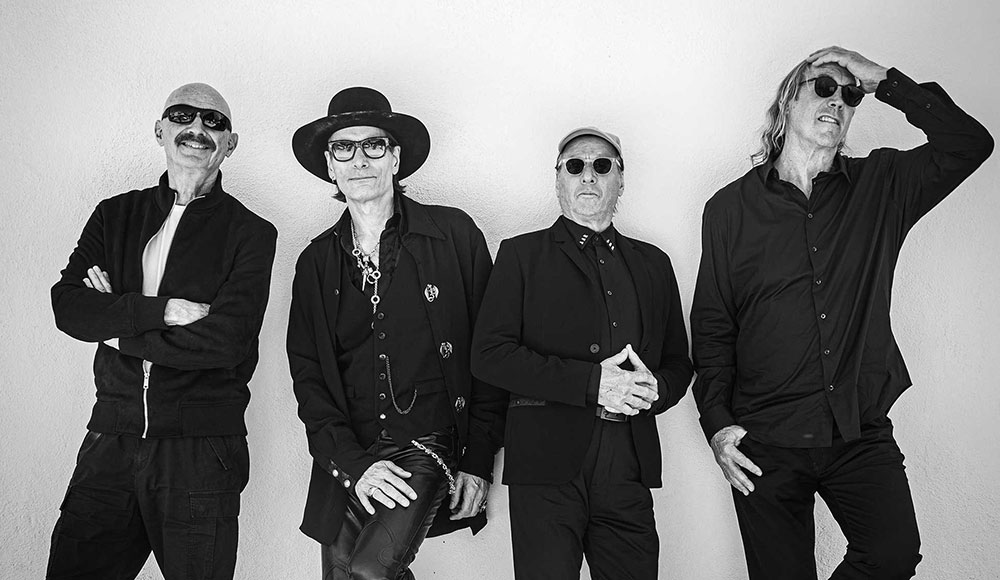Though they had been one of the most boundary-pushing and critically successful bands to come out of the British progressive rock movement, in 1975 and at the height of their popularity, King Crimson broke up.
Mainstay Robert Fripp moved on to lower-profile projects, working on solo projects and with other groundbreaking artists like David Bowie and Peter Gabriel. It seemed that the King Crimson story was over.
But as the 1980s dawned, the always unpredictable Fripp brought together a new group. Acclaimed drummer Bill Bruford—who years earlier had left Yes for the bigger challenge of King Crimson—returned. The other two spots in this new quartet would be filled for the first time by non-British musicians: American guitarist Adrian Belew and bassist/Chapman Stick master Tony Levin.
The new King Crimson sported a very different sound, combining elements of industrial, gamelan, art rock and dance rhythms, while maintaining an imposing progressive mentality. The group was a critical success, releasing three highly regarded albums in the early 1980s: Discipline, Beat and Three of a Perfect Pair.
That lineup would be the longest-enduring in King Crimson’s storied history, but it ceased activity in 1984. The group would reunite in yet other configurations three more times before its final dissolution in 2022; all four members of the ’80s lineup would be involved in at various points and to varying degrees, with Fripp again the only constant. After release of a career-capping documentary about the group, King Crimson ended, this time likely forever. But the band’s story still wasn’t over.
With the blessing and encouragement of Fripp—he even gave the project its name—BEAT came together earlier this year. With a specific mandate to play and reinterpret the music of that 1980s lineup, Belew assembled a new four-man group. Not a tribute but rather a celebration, BEAT re-introduces works from the band’s 1980–’84 repertoire for audiences old and new. Joining Belew and Levin are two musicians with heavyweight pedigrees all their own. Three-time Grammy winner Steve Vai is an acclaimed solo guitarist and a veteran of Frank Zappa’s band. Drummer Danny Carey lays down the thunderous and complex beats for progressive metal band Tool. Together the four members of BEAT celebrate and interpret a specific era of King Crimson music.
Thanks to the adventurousness of the musicians involved, BEAT is not a note-for-note re-creation of that music. “We’re carving out our own territory as we tour,” Tony Levin says. “The music has specific parts, but it has room for improvisation,” he explains. “Steve scrupulously learned all of Robert Fripp’s parts, but he doesn’t have to play them all.” Levin says that even when Vai plays the same notes Fripp did, he delivers them with his own feel, bringing it to “a different place.”
Levin takes a similar approach. On “Sleepless,” an Adrian Belew composition that ranks among the most accessible of King Crimson tunes, Levin employs a radically different technique from what he did on the 1984 album and tour. “I play it with Funk Fingers now,” he explains, referring to a device he invented to combine the percussive qualities of drumming with the musical tonalities of bass guitar. “The song’s introduction has nothing to do with the way we did it before,” he says. And that attitude is at the foundation of BEAT. “What excites me musically is to see where this material can go,” Levin says.
The interplay among the four virtuoso musicians—two with extensive immersion in King Crimson’s catalog, and two who are longtime fans but have substantial bodies of work all their own—guarantees musical fireworks. And even when they’re not improvising, all four have to remain on their toes in case real-time changes from one or more of them require instant adjustment in what another is doing.
“I thought I knew all the lyrics until [we did] the first couple of shows,” Levin admits with a chuckle. “That’s when I realized I’m not singing the same words as Adrian is!” He adds that Belew doesn’t even sing or phrase his lyrics the same way every night. “And it’s my job to sing them the way he’s singing, not the way he sang them on the record.”
The BEAT tour kicked off with a September date in San Jose. That show and many others quickly sold out; in response to overwhelming demand, the original run of 27 concerts was expanded to include 65 dates in all, including a return to San Jose near the end of the tour. Levin says that he had prior commitments that conflicted with the proposed additions to the tour, but he was able to make it all work. “I was thrilled about that,” he says. “I get the sense that the people who come to the shows are really enjoying them, and that they think it’s something special,” he says. “As we do in the band.”
Levin has definite ideas as to why King Crimson’s complex music resonates with listeners. “My wife has this expression: ‘It’s not a one-listen record,’” he explains. “And that really describes King Crimson music. It takes some effort to get used to it, and the potential reward is bigger.”
BEAT plays at 8pm on Nov. 20 at the San Jose Civic, 135 W San Carlos St, San Jose. Tickets: $65–$169. sanjosetheaters.org



